DTI: Worst is over for Philippine economy
MANILA, Philippines — The Department of Trade and Industry (DTI) said the worst is over for the Philippines and the economy is seeing signs of recovery with improvements in different economic indicators as preparations for the COVID-19 vaccine rollout are underway.
“We are still facing risk, but I would also say that the worst is over. 2020 was really the height of the lockdown and we saw the economy really dropping. But ever since, we have seen signs of recovery from GDP (gross domestic product) to unemployment rates,” Trade Secretary Ramon Lopez said in an interview with CNBC Asia.
Latest available data showed the economy posted a smaller contraction of 11.5 percent in the third quarter after declining by 16.9 percent in the second quarter.
The country’s unemployment rate also eased to 8.7 percent in October from 10 percent in July and 17.6 percent in April.
Exports, meanwhile, are back to positive territory, expanding by three percent in November last year.
“We have been reopening the economy gradually and safely toward the latter part of 2020. That is the reason why we have been seeing signs of recovery in many aspects,” Lopez said.
He said the country is also preparing for the arrival and distribution of vaccines in the country following deals entered into with suppliers.
“There are still challenges, but we expect the vaccines at least can provide some level of prevention despite new variants coming out. We simply just have to manage the virus and the policy of the Philippine leaders right now is to be able to have an attitude of risk management rather than risk avoidance,” he said.
In addition, he said US President-elect Joe Biden’s announcement of a $1.9 trillion COVID relief plan is a positive development for other countries including the Philippines.
“Definitely, we need America, the biggest economy in the world to really be out there and recovering fast as well. The recovery of America is also a recovery for the world and for other countries of the world,” he said.
He said the Regional Comprehensive Economic Partnership (RCEP) agreement signed by the Philippines with other Association of Southeast Asian members Brunei Darussalam, Cambodia, Indonesia, Lao People’s Democratic Republic, Malaysia, Myanmar, Singapore, Thailand, and Vietnam, as well as trade partners Australia, China, Japan, Korea, and New Zealand last November, would likewise be beneficial for the country.
“With RCEP, aside from the ease of getting inputs, it attracts more companies to locate here because there is still less hindrance on imported inputs. At the same time, you can consider the Philippines (if you are not an RCEP country) as a base and your gateway to enter and have market access to other RCEP participating countries. We are part of this global value chain and certainly being part of RCEP will be an advantage on the smoother flow of goods, services, and investments,” he said.
Following the signing of the RCEP, he said the DTI is now looking at the possibility of joining the Comprehensive and Progressive Agreement for Trans-Pacific Partnership (CPTPP) entered into by Australia, Brunei, Canada, Chile, Japan, Malaysia, Mexico, New Zealand, Peru, Singapore and Vietnam.
“Our intention really is to look into that regional bloc so that we can also benefit from a freer global trade bloc that CPTPP has,” he said.
Souirce: https://www.philstar.com/business/2021/01/18/2071113/dti-worst-over-philippine-economy


 English
English




